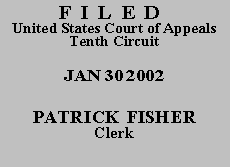

| MARY FRANCES DURAN,
Plaintiff-Appellant, v. NEW MEXICO DEPARTMENT OF LABOR, Defendant-Appellee. |
|
Plaintiff Mary Frances Duran, an Hispanic woman, began working for defendant New Mexico Department of Labor in 1975 at the age of 42. She voluntarily retired in 1999 at the age of 65. During her employment, plaintiff sought and was rejected for several different promotions. She also objected to certain disciplinary actions taken against her and to several of her annual performance evaluations. She filed several charges of discrimination and retaliation with the Equal Employment Opportunity Commission (EEOC). She then filed this suit, alleging claims of race and sex discrimination(1) and retaliation under Title VII of the Civil Rights Act of 1964, 42 U.S.C. §§ 2000e to 2000e-17. The district court granted summary judgment in favor of defendant. Plaintiff appeals. We have jurisdiction under 28 U.S.C. § 1291. We affirm.
Plaintiff argues on appeal that: (1) there was a causal connection between her EEOC complaints and defendant's actions in refusing to promote her; (2) there was a causal connection between her EEOC complaints and defendant's actions in denying her privileges and in disciplining her; (3) there was a causal connection between her EEOC complaints and defendant's allegedly unfair and false evaluations of her job performance; (4) defendant's denial of privileges to her and disciplinary actions against her constituted adverse employment actions sufficient to give rise to Title VII claims; (5) defendant's allegedly unfair and false evaluations of her job performance constituted adverse employment actions sufficient to give rise to Title VII claims; (6) defendant's justifications for its recurring refusals to promote her were pretexts for discrimination; (7) defendant's denial of privileges to her and disciplinary actions against her constituted disparate treatment giving rise to an inference of discrimination; and (8) defendant's allegedly unfair and false evaluations of her job performance constituted disparate treatment giving rise to an inference of discrimination.
We review the grant of summary judgment de novo, applying the same standard as the district court under Fed. R. Civ. P. 56(c). Adler v. Wal-Mart Stores, Inc., 144 F.3d 664, 670 (10th Cir. 1998). Summary judgment is appropriate "if the pleadings, depositions, answers to interrogatories, and admissions on file, together with the affidavits, if any, show that there is no genuine issue as to any material fact and that the moving party is entitled to a judgment as a matter of law." Rule 56(c). We view the facts and the reasonable inferences to be drawn from them in the light most favorable to the nonmoving party. Adler, 144 F.3d at 670. "An issue of fact is 'material' if under the substantive law it is essential to the proper disposition of the claim." Id.
We have carefully reviewed the district court's decision in light of the parties' briefs and the record on appeal. We are unpersuaded by plaintiff's claims of error. Accordingly, for substantially the same reasons as those set forth in the district court's thorough April 19, 2001 memorandum opinion, the judgment is AFFIRMED.
Entered for the Court
Circuit Judge
*. This order and judgment is not binding precedent, except under the doctrines of law of the case, res judicata, and collateral estoppel. The court generally disfavors the citation of orders and judgments; nevertheless, an order and judgment may be cited under the terms and conditions of 10th Cir. R. 36.3.
1. An additional claim of age discrimination was dismissed after the Supreme Court decided that a claim under the Age Discrimination in Employment Act may not be maintained against a State without that State's consent. See Kimel v. Florida Bd. of Regents, 528 U.S. 62 (2000).